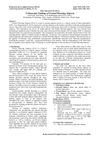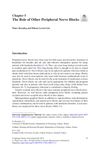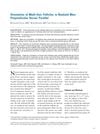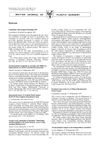 1 citations,
March 2022 in “Cureus”
1 citations,
March 2022 in “Cureus” A woman with lupus and systemic sclerosis developed severe acne that didn't improve with treatment and died from pneumonia and septic shock.
 1 citations,
July 2020 in “Benha Journal of Applied Sciences”
1 citations,
July 2020 in “Benha Journal of Applied Sciences” Trichoscopy is useful for diagnosing Frontal Fibrosing Alopecia.

The conclusion is that closing scalp wounds is possible, but restoring hair without donor material is still a major challenge.
 1 citations,
July 2014 in “International Journal of Dermatology”
1 citations,
July 2014 in “International Journal of Dermatology” A cancer patient developed a type of hair loss after starting a cancer drug called vandetanib.
 1 citations,
June 2001 in “International Journal of Cosmetic Surgery and Aesthetic Dermatology”
1 citations,
June 2001 in “International Journal of Cosmetic Surgery and Aesthetic Dermatology” The Anchor Flap is an effective, quick treatment for severe baldness but requires skilled surgeons and careful patient selection.
 February 2023 in “Vlaams dierengeneeskundig tijdschrift”
February 2023 in “Vlaams dierengeneeskundig tijdschrift” Two young cats with a severe ear and skin condition improved with immune system-targeting treatments.

Accurate diagnosis and tailored treatments are crucial for managing hair loss in humans and animals.
 January 2019 in “Headache”
January 2019 in “Headache” Peripheral nerve blocks are a safe and effective way to treat various headaches and provide lasting pain relief.

An 11-year-old female Pinscher with Pemphigus Foliaceus was successfully diagnosed and treated.

Botulinum toxin-A may increase hair growth and reduce hair loss in men with baldness, and injecting near blood vessels can improve pain relief and last longer.

Botulinum toxin-A injections in the scalp can reduce hair loss and promote new hair growth in men with certain types of baldness.

Botulinum toxin injections can reduce hair loss and stimulate new hair growth in some men with male pattern baldness.
 May 2006 in “Dermatologic Surgery”
May 2006 in “Dermatologic Surgery” Most nonbald men's multi-hair follicles are naturally positioned perpendicular to a line from the scalp's crown, which is important for natural-looking hair transplants.
 September 1997 in “British Journal of Plastic Surgery”
September 1997 in “British Journal of Plastic Surgery” The document announced plastic surgery events and courses for late 1997.
 April 1981 in “Postgraduate Medicine”
April 1981 in “Postgraduate Medicine” In 1981, the punch graft technique was the main method for hair transplantation, and medical treatments for baldness were not very effective.
 288 citations,
June 2009 in “Human reproduction update”
288 citations,
June 2009 in “Human reproduction update” The modified Ferriman-Gallwey method is a useful tool for diagnosing hirsutism.
 166 citations,
September 2011 in “Dermatologic Surgery”
166 citations,
September 2011 in “Dermatologic Surgery” Platelet-rich plasma with a new carrier significantly increases hair thickness without serious side effects.
 152 citations,
December 2007 in “Gender Medicine”
152 citations,
December 2007 in “Gender Medicine” Male and female skin differ due to hormones, affecting conditions like hair loss, acne, and skin cancer, and suggesting a need for gender-specific treatments.
 138 citations,
February 2007 in “European journal of cancer”
138 citations,
February 2007 in “European journal of cancer” EGFR inhibitors often cause skin problems and other side effects, but these are usually reversible and can be managed to keep patients comfortable.
 128 citations,
January 2001 in “American Journal of Clinical Dermatology”
128 citations,
January 2001 in “American Journal of Clinical Dermatology” Coal tar shampoos, salicylic acid, and topical corticosteroids are effective for scalp psoriasis, with Vitamin D3 analogues also showing benefits; severe cases may require stronger medication with more risks.
 126 citations,
January 1987 in “Journal of The American Academy of Dermatology”
126 citations,
January 1987 in “Journal of The American Academy of Dermatology” The document concludes that understanding hair structure is key to diagnosing hair abnormalities and recommends gentle hair care for management.
 125 citations,
December 2016 in “Molecules”
125 citations,
December 2016 in “Molecules” Substances from Chinese medicines show promise for immune support and disease prevention, but the way they are processed affects their effectiveness.
 123 citations,
August 2005 in “Journal of the European Academy of Dermatology and Venereology”
123 citations,
August 2005 in “Journal of the European Academy of Dermatology and Venereology” The study found that Frontal Fibrosing Alopecia affects a broader age range of women and early treatment can help stop hair loss.
 118 citations,
September 2004 in “Clinics in Dermatology”
118 citations,
September 2004 in “Clinics in Dermatology” Hormones, especially androgens, play a big role in acne, but most acne sufferers don't have a hormone disorder. Hormonal treatments, including birth control pills, can be very effective for women whose acne doesn't improve with regular treatments.
 116 citations,
December 2017 in “International Journal of Women's Dermatology”
116 citations,
December 2017 in “International Journal of Women's Dermatology” Adult female acne treatment should be personalized, considering individual preferences and pregnancy, using various topical and oral medications while managing side effects and resistance.
 105 citations,
April 2004 in “Dermatologic Therapy”
105 citations,
April 2004 in “Dermatologic Therapy” The document concludes that proper diagnosis and a combination of medical, hair-care, and surgical treatments are important for managing alopecia in black women.
 94 citations,
October 2017 in “International Journal of Dermatology”
94 citations,
October 2017 in “International Journal of Dermatology” Lichen planus pigmentosus causes dark skin patches and is treated by avoiding triggers and using anti-inflammatory medications.
 88 citations,
January 2013 in “Indian Journal of Dermatology, Venereology and Leprology”
88 citations,
January 2013 in “Indian Journal of Dermatology, Venereology and Leprology” Minoxidil and finasteride effectively treat hair loss.
 81 citations,
March 2009 in “Seminars in Cutaneous Medicine and Surgery”
81 citations,
March 2009 in “Seminars in Cutaneous Medicine and Surgery” Effective hair loss treatment in women requires correct diagnosis and can include medications like minoxidil, antiandrogens, and treatments for underlying conditions like PCOS.
 78 citations,
May 1989 in “The Journal of Clinical Endocrinology & Metabolism”
78 citations,
May 1989 in “The Journal of Clinical Endocrinology & Metabolism” Spironolactone effectively reduces hair growth in women with hirsutism and is generally well-tolerated.






























